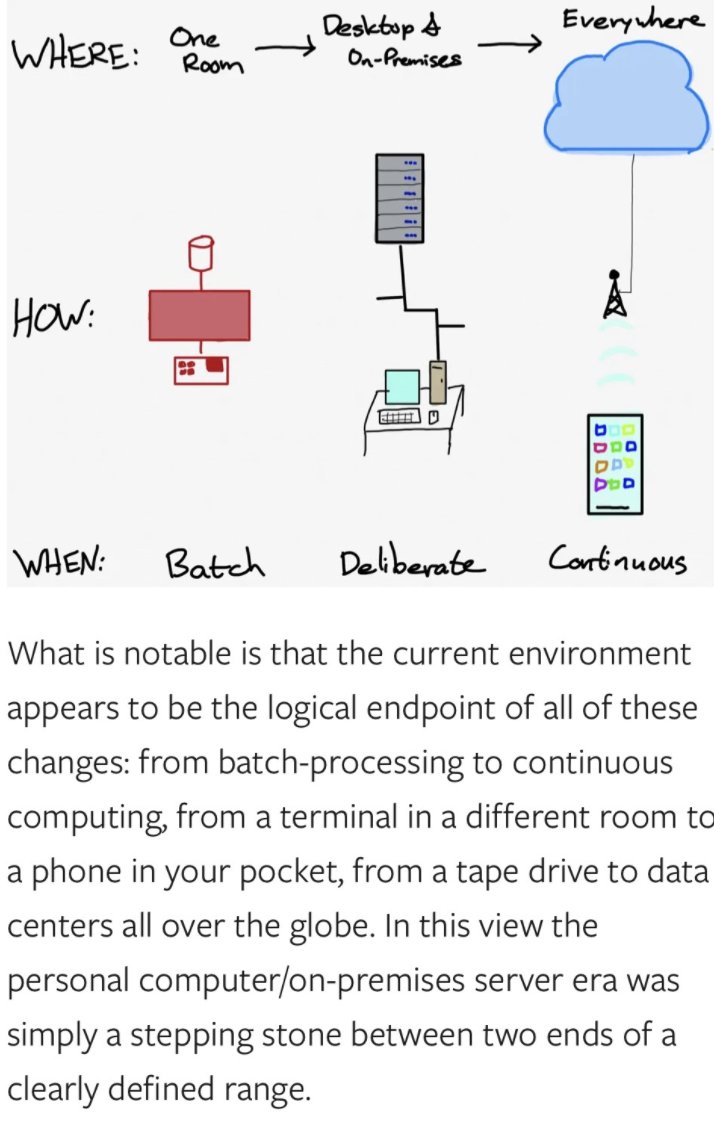
There is a widespread view that the internet and software industry is now mature, that the historical pattern of disruptive revolutions every 10-15 years is now over. 🧵
Ben Thompson provides an excellent articulation of this view (as he often does) stratechery.com/2020/the-end-o… 

In my experience, this view is tacitly held by most of the establishment: institutional investors, tech execs, policymakers, media, etc. It affects valuations, corporate behavior, media coverage, and policy making.
I believe there are at least 3 major reasons why this view is wrong: plasticity of software and the internet, new vectors of computing improvement, and generational desire for new frontiers. I'll explain these below.
1. Plasticity of software and the internet.
The core of most of these arguments are analogies to past industries. Ben cites the auto industry. Other writers cite past information networks like broadcast TV and radio.
The core of most of these arguments are analogies to past industries. Ben cites the auto industry. Other writers cite past information networks like broadcast TV and radio.
But it’s a mistake to analogize software to hardware. Software has a much richer design space — closer in the breadth of possibilities to creative activities like fiction writing than traditional engineering.
https://twitter.com/cdixon/status/1459214408333332485
Moreover, the internet was specifically designed to embrace this plasticity.
The internet is the ultimate software-based network, consisting of a relatively simple core layer connecting billions of fully programmable computers at the edge.
The internet is the ultimate software-based network, consisting of a relatively simple core layer connecting billions of fully programmable computers at the edge.
Computers connected to the internet are, by and large, free to run whatever software their owners choose. Whatever can be dreamt up, with the right set of incentives, can quickly propagate across the internet.
2. New vectors of computing improvement
Ben argued that one reason the software industry is mature is that it has reached its logical endpoint.
Ben argued that one reason the software industry is mature is that it has reached its logical endpoint.

The assumption is that the only vectors of improvement that matter are the ones the tech industry has traditionally focused on: greater data availability, better computing performance, smaller devices, and so on.
People with this mindset look at a blockchain and see a slow database. (And while blockchains performance is improving rapidly, running a consensus mechanism will always have some performance overhead.)
Blockchains offer to improve computers along different vectors. Specifically, they allow computers to make credible commitments that in turn unlock new classes of applications. cdixon.org/2020/01/26/com…
Those applications can have a profound impact on how power and money is distributed across the internet.
Thinking about computing improvements along economic and political vectors is very foreign to the traditional tech mindset.
Thinking about computing improvements along economic and political vectors is very foreign to the traditional tech mindset.
Framed this way, we are nowhere near the logical endpoint of the internet's evolution.
3. Generational desire for new frontiers
A lot of what I do in my job is talk to people moving into web3, either as founders or as employees in companies I work with. Many are coming from big tech companies.
A lot of what I do in my job is talk to people moving into web3, either as founders or as employees in companies I work with. Many are coming from big tech companies.
The story is the same every time: they don’t want to spend their lives optimizing ad clicks; they want to work on the frontier and help shape a new industry.
They want an internet of their own, that reflects their values and culture and lets them feel like genuine participants as users and builders.
“If you want to build a ship, don’t drum up the men and women to gather wood, divide the work, and give orders. Instead, teach them to yearn for the vast and endless sea.”
There are a lot of smart, industrious people yearning for the sea. Betting that the internet is mature is betting against them.
Quote from Antoine de Saint-Exupéry.
Also, I specifically said “institutional investors” above because, in my view, retail investors have been especially prescient over the last decade — and continue to lead the way on long-term vision.
Retail investors sometimes lack the resources to correctly choose between companies within categories (micro) but are much better at big picture vision (macro). Institutions the reverse.
• • •
Missing some Tweet in this thread? You can try to
force a refresh



